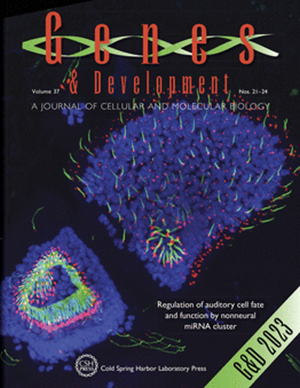CDK4功能缺失突变导致小头畸形和身材矮小
IF 7.7
1区 生物学
Q1 CELL BIOLOGY
引用次数: 0
摘要
细胞数量是哺乳动物机体大小的主要决定因素。在人类中,细胞周期成分的基因突变通过减少细胞数量导致生长受限。在这里,我们发现CDK4的双等位基因突变是小头畸形和身材矮小的一个原因。CDK4编码一个关键的细胞周期激酶,该激酶在细胞周期的G1期与d型细胞周期蛋白结合,通过视网膜母细胞瘤(RB)磷酸化促进s期进入和细胞增殖。CDK4和CDK6被认为是功能冗余的,并且是化疗CDK4/6抑制剂的联合靶向。利用分子和细胞生物学方法,我们发现在CDK4突变的细胞中检测不到功能性CDK4蛋白。细胞在G1期表现出RB磷酸化受损,导致G1/ s期转变缺陷和细胞增殖减少,与细胞CDK4酶活性完全丧失一致。总之,这些发现表明CDK4本身是细胞增殖、人类生长和发育过程中大脑大小决定所必需的。本文章由计算机程序翻译,如有差异,请以英文原文为准。
CDK4 loss-of-function mutations cause microcephaly and short stature
Cell number is a major determinant of organism size in mammals. In humans, gene mutations in cell cycle components result in restricted growth through reduced cell numbers. Here we identified biallelic mutations in CDK4 as a cause of microcephaly and short stature. CDK4 encodes a key cell cycle kinase that associates with D-type cyclins during G1 of the cell cycle to promote S-phase entry and cell proliferation through retinoblastoma (RB) phosphorylation. CDK4 and CDK6 are believed to be functionally redundant and are targeted jointly by chemotherapeutic CDK4/6 inhibitors. Using molecular and cell biology approaches, we show that functional CDK4 protein is not detectable in cells with CDK4 mutations. Cells display impaired RB phosphorylation in G1, leading to G1/S-phase transition defects and reduced cell proliferation, consistent with complete loss of cellular CDK4 enzymatic activity. Together, these findings demonstrate that CDK4 is itself required for cell proliferation, human growth, and brain size determination during development.
求助全文
通过发布文献求助,成功后即可免费获取论文全文。
去求助
来源期刊

Genes & development
生物-发育生物学
CiteScore
17.50
自引率
1.90%
发文量
71
审稿时长
3-6 weeks
期刊介绍:
Genes & Development is a research journal published in association with The Genetics Society. It publishes high-quality research papers in the areas of molecular biology, molecular genetics, and related fields. The journal features various research formats including Research papers, short Research Communications, and Resource/Methodology papers.
Genes & Development has gained recognition and is considered as one of the Top Five Research Journals in the field of Molecular Biology and Genetics. It has an impressive Impact Factor of 12.89. The journal is ranked #2 among Developmental Biology research journals, #5 in Genetics and Heredity, and is among the Top 20 in Cell Biology (according to ISI Journal Citation Reports®, 2021).
 求助内容:
求助内容: 应助结果提醒方式:
应助结果提醒方式:


